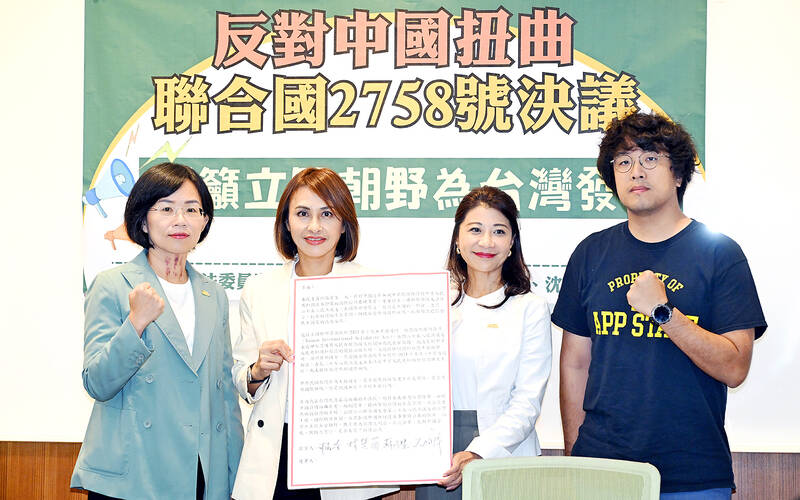Lawmakers from all political parties should support a proposed motion that would clarify UN Resolution 2758, Democratic Progressive Party (DPP) legislators told a news conference yesterday, but opposition party members later walked out of a cross-party meeting when the topic was raised.
DPP legislators Chiu Yi-ying (邱議瑩), Michelle Lin (林楚茵), Su Chiao-hui (蘇巧慧) and Puma Shen (沈伯洋) said that the news conference was held to “oppose China’s distortion of UN Resolution 2758 and call on all political parties to speak up for Taiwan.”
UN Resolution 2758 does not have anything to do with Taiwan’s sovereignty and international status, and Taiwan rejects China’s attempts to distort the truth, they said.

Photo: Liao Chen-huei, Taipei Times
The US House of Representatives in July last year passed the Taiwan International Solidarity Act, which affirms that UN Resolution 2758 does not refer to Taiwan, a sentiment echoed in July by the Inter-Parliamentary Alliance on China’s own resolution.
More recently, the Australian Senate and the Dutch House of Representatives also passed motions clarifying the definition of UN Resolution 2758.
Now is the time for Taiwan to unite and make its voice heard by the international community, Chiu said.
UN Resolution 2758 should no longer block Taiwan from international participation, she said.
The motions in Australia and the Netherlands reflect Taiwan’s growing support abroad, Su said.
UN Resolution 2758 directly affects issues such as encroachment of Chinese fishing vessels into Taiwan’s waters and the M503 flight route, Su said.
Clarifying Taiwan’s international status would allow for it to join international organizations, she said.
The international movement to clarify Resolution 2758, as well as the recent transit of a German ship through the Taiwan Strait, show that Taiwan is important to the world, Lin said.
Now is the time for solidarity, Lin said, adding that the Chinese Nationalist Party (KMT) and the Taiwan People’s Party (TPP) should give up their alignment with Beijing’s position and give Taiwan back to Taiwanese.
The lack of clarity regarding Resolution 2758 lies at the heart of an international legal battle between China and the world, Shen said.
As China continues to expand its jurisdiction, Taiwan must know how to respond to the country’s legal challenges.
After the news conference, Legislative Speaker Han Kuo-yu (韓國瑜) convened talks on the new legislative session.
During the meeting, the DPP caucus proposed a joint statement from all parties, but Han and other KMT legislators, as well as those from the TPP, walked out of the meeting.
“I had to fight back tears; this is the reality of Taiwan’s situation,” DPP caucus secretary-general Rosalia Wu (吳思瑤) said, describing the feeling of reading the proposed statement to a room without opposition lawmakers in attendance.
The KMT and the TPP are disregarding what is best for Taiwan, Wu said.
The DPP will appeal to the public to ensure that the international community hears the true voice of the people, she said.

Chinese Nationalist Party (KMT) Chairman Eric Chu (朱立倫), spokeswoman Yang Chih-yu (楊智伃) and Legislator Hsieh Lung-chieh (謝龍介) would be summoned by police for questioning for leading an illegal assembly on Thursday evening last week, Minister of the Interior Liu Shyh-fang (劉世芳) said today. The three KMT officials led an assembly outside the Taipei City Prosecutors’ Office, a restricted area where public assembly is not allowed, protesting the questioning of several KMT staff and searches of KMT headquarters and offices in a recall petition forgery case. Chu, Yang and Hsieh are all suspected of contravening the Assembly and Parade Act (集會遊行法) by holding

PRAISE: Japanese visitor Takashi Kubota said the Taiwanese temple architecture images showcased in the AI Art Gallery were the most impressive displays he saw Taiwan does not have an official pavilion at the World Expo in Osaka, Japan, because of its diplomatic predicament, but the government-backed Tech World pavilion is drawing interest with its unique recreations of works by Taiwanese artists. The pavilion features an artificial intelligence (AI)-based art gallery showcasing works of famous Taiwanese artists from the Japanese colonial period using innovative technologies. Among its main simulated displays are Eastern gouache paintings by Chen Chin (陳進), Lin Yu-shan (林玉山) and Kuo Hsueh-hu (郭雪湖), who were the three young Taiwanese painters selected for the East Asian Painting exhibition in 1927. Gouache is a water-based

Taiwan would welcome the return of Honduras as a diplomatic ally if its next president decides to make such a move, Minister of Foreign Affairs Lin Chia-lung (林佳龍) said yesterday. “Of course, we would welcome Honduras if they want to restore diplomatic ties with Taiwan after their elections,” Lin said at a meeting of the legislature’s Foreign Affairs and National Defense Committee, when asked to comment on statements made by two of the three Honduran presidential candidates during the presidential campaign in the Central American country. Taiwan is paying close attention to the region as a whole in the wake of a

OFF-TARGET: More than 30,000 participants were expected to take part in the Games next month, but only 6,550 foreign and 19,400 Taiwanese athletes have registered Taipei city councilors yesterday blasted the organizers of next month’s World Masters Games over sudden timetable and venue changes, which they said have caused thousands of participants to back out of the international sporting event, among other organizational issues. They also cited visa delays and political interference by China as reasons many foreign athletes are requesting refunds for the event, to be held from May 17 to 30. Jointly organized by the Taipei and New Taipei City governments, the games have been rocked by numerous controversies since preparations began in 2020. Taipei City Councilor Lin Yen-feng (林延鳳) said yesterday that new measures by